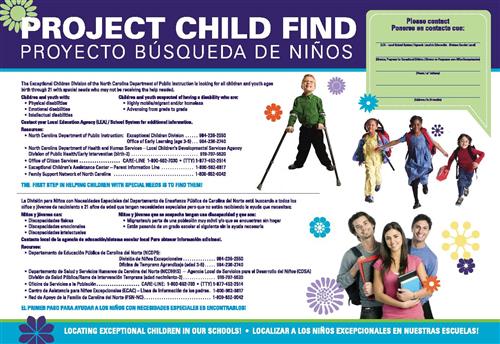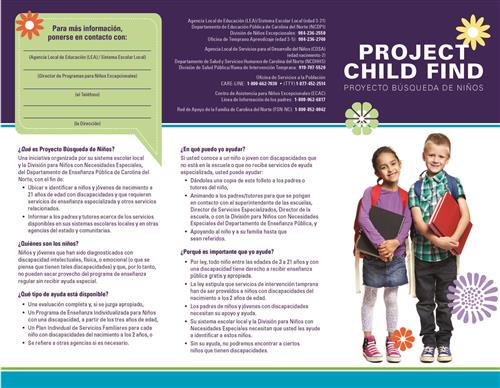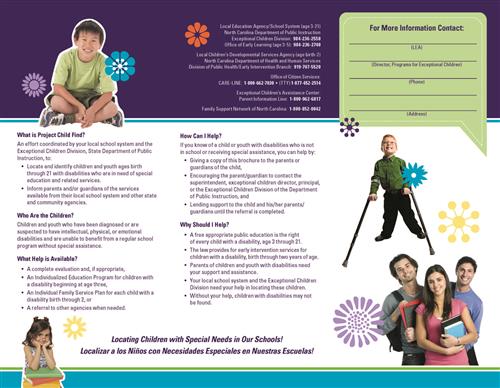Child Find & Accessing EC Services in CMS
Child Find
Charlotte-Mecklenburg Schools is responsible for locating, identifying, and evaluating students with disabilities enrolled in a school within the district.
Accessing Special Education Services
Parents of children ages three to twenty-one years may suspect delays in the development of academic, speech-language, readiness, motor, social-behavior, and self-help skills. Concerned parents can contact the students' home school or the Exceptional Children Program at 980-343-6960 or ec@cms.k12.nc.us to request an evaluation for services consideration.
Students may contact their school or the Exceptional Children Program once they reach age 18, the age of majority in the State of North Carolina, because the ability to make educational decisions and procedural safeguards transfer to the student at that time (unless a guardian has been appointed to represent the student).
Please view our Child Find FAQ at the bottom of this page for more information.
Charlotte-Mecklenburg Schools provides special education and related services according to the federal mandates of the Individual with Disabilities Act and the regulations of the North Carolina Public School Law, Article 9.
The special education process
- Child Find Video Overview
- Child Find FAQ/Preguntas frecuentes de Búsqueda de Niños
- Project ChildFind/Proyect Búsqueda de Niños
For further information regarding Child Find, or if you suspect your student may have a disability and need special education and/or related services, contact the Exceptional Children Program at 980-343-6960 or ec@cms.k12.nc.us.



- Referral Meeting/La Reunión de Recomendación
- Eligibility Meeting/La Reunión de Elegibilidad
- Reevaluation Determination/La Determinación de una Nueva Evaluación
- IEP Meeting/La Reunión del Programa de Educación Individualizado (IEP)
- Programs and Services (visit our Programs and Services page to learn more)
Eligibility for special education services
The Public Schools of North Carolina, Exceptional Children Division provides local educational agencies with detailed procedures for delivering special education services. These rules and regulations are detailed in Policies Governing Services For Children With Disabilities.
Services are provided under the following areas of eligibility: Update-Download-Relink/or convert to BB
- Autism Spectrum Disorder
- Deaf/Blindness
- Deaf
- Developmental Delay
- Serious Emotional Disability
- Hearing Impairment
- Intellectual Disability
- Multiple Disabilities
- Orthopedic Impairment
- Other Health Impairment
- Specific Learning Disability
- Speech/Language Impairment
- Traumatic Brain Injury
- Visual Impairment
Dyslexia is a specific learning disability that is neurobiological in origin. It is characterized by difficulties with accurate and/or fluent word recognition and poor spelling and decoding abilities. These difficulties typically result from a deficit in the phonological component of language that is often unexpected in relation to other cognitive abilities and the provision of effective classroom instruction. Secondary consequences may include problems in reading comprehension and reduced reading experience that can impede the growth of vocabulary and background knowledge.
Adopted by the IDA Board of Directors, Nov. 12, 2002. This definition is also used by the National Institute of Child Health and Human Development (NICHD).
The definition of dyslexia was added to the NC Policies Governing Services for Children with Disabilities in August 2017.
More information can be found at https://ec.ncpublicschools.gov/disability-resources/specific-learning-disabilities/dyslexia-and-dyscalculia/dyslexia-and-dyscalculia.

